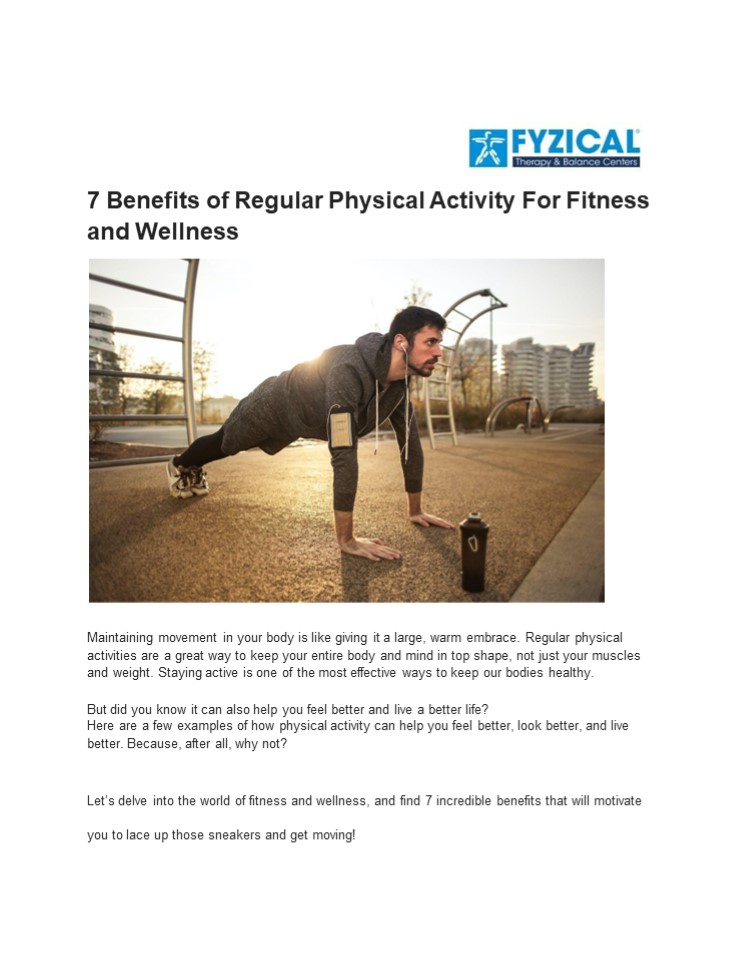7 Benefits of Regular Physical Activity For Fitness and Wellness - PowerPoint PPT Presentation
Title:
7 Benefits of Regular Physical Activity For Fitness and Wellness
Description:
Maintaining movement in your body is like giving it a large, warm embrace. Regular physical activities are a great way to keep your entire body and mind in top shape, not just your muscles and weight. Staying active is one of the most effective ways to keep our bodies healthy. – PowerPoint PPT presentation
Number of Views:2
Title: 7 Benefits of Regular Physical Activity For Fitness and Wellness
1
7 Benefits of Regular Physical Activity For
Fitness and Wellness
Maintaining movement in your body is like giving
it a large, warm embrace. Regular physical
activities are a great way to keep your entire
body and mind in top shape, not just your muscles
and weight. Staying active is one of the most
effective ways to keep our bodies healthy. But
did you know it can also help you feel better and
live a better life? Here are a few examples of
how physical activity can help you feel better,
look better, and live better. Because, after
all, why not?
Lets delve into the world of fitness and
wellness, and find 7 incredible benefits that
will motivate you to lace up those sneakers and
get moving!
2
1. It helps combat health problems and
diseases Concerned about heart disease? Trying
to avoid high blood pressure? Being active
increases high-density lipoprotein (HDL)
cholesterol, the good cholesterol, and
decreases harmful triglycerides, regardless of
your current weight. This one-two punch
maintains your blood flowing properly, lowering
your risk of heart and blood vessel disorders,
sometimes known as cardiovascular diseases.
2. Happy Hormones, Happy You When you exercise,
your body produces endorphins, sometimes known as
happy hormones. These little mood enhancers
can assist with stress, anxiety, and even
depression. In other words, exercising not only
makes you healthier physically but also
considerably better mentally.
3. Helps in weight loss Inactivity may have a
significant role in weight gain and obesity,
which can lead to fitness and wellness concerns.
Exercise can help you manage your weight by
reducing your energy expenditure, commonly known
as spending. A lower calorie intake may lower
your metabolic rate, which may potentially
postpone weight reduction. However, frequent
exercise can boost your metabolic rate, help you
burn more calories and help you maintain your
weight.
4. Develop stronger muscles and Bones Your body
gradually loses its strength, endurance, and
capacity to operate normally if you dont
exercise regularly. Its similar to the proverb
that goes, You dont grow old by stopping to
move you grow old by stopping to move. Muscle
strength is increased by exercise, and this
improves your capacity for other physical
activities.
3
By lifting weights and performing other
muscle-strengthening workouts, you can either
maintain or improve your muscle mass and
strength. This is especially important for older
people experiencing age-related loss of strength
and muscular mass.
5. Improve your sleep quality Not being able to
sleep? Regular exercise can improve and deepen
your sleep and help you fall asleep more
quickly. Just be careful not to work out right
before bed because you could be too motivated to
fall asleep. Exercise causes your body to create
endorphins and relaxants, which can improve your
mood. This can help you manage stress and reduce
the likelihood that you will experience
depression.
6. Boost your energy Regular physical activity
boosts circulation and oxygen flow, providing you
with a natural energy boost. So, whether its a
morning jog or an evening dancing class,
exercising your body may leave you feeling
energized and ready to handle whatever comes your
way.
7. Helps in fall prevention Climbing stairs,
shopping for food, and playing with your
grandchildren are examples of everyday
activities. A functional constraint is the
inability to do daily activities. Physically
active middle-aged or older people are less
likely to experience functional limits than
inactive people. Doing a variety of physical
activities improves physical function and lowers
the risk of falls or harm from a fall in older
people. Include aerobic, muscle-strengthening,
and balance-training activities.































